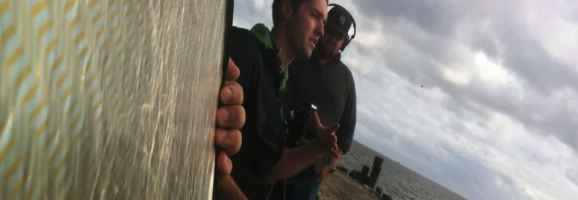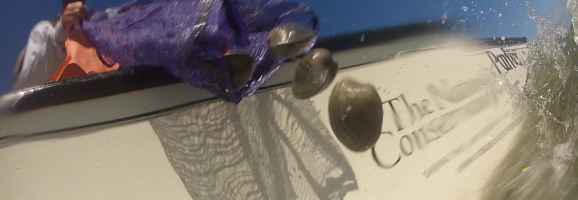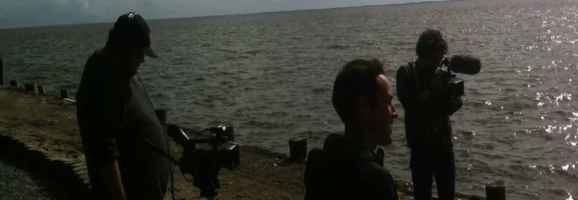The Boy and the Starfish: Interview with Filmmaker Gareth Burghes
While attending a semester at Stony Brook University, a fellow filmmaker and student Gareth Burghes, caught my eye. For he was a determined scientist with his heart set on making a little film about the marine habits of Long Island Shellfishing. His short film was offered to be aired on local television networks. With graduation, the filmmaker found himself in search of a job, and lots of free time. While sending his recently finished documentary back into post for some fine tuning, and festival ready status, Gareth Burghes was kind enough to give me a ring and discuss his plans with his recently founded production company, Lagamorph Films.
The Artifice [A]: Alright, we are rolling captain. So first off… what the fuck is a Lagamorph?
Gareth Burghes [GB]: My dad works in molecular genetics, and he received a form for animals that said there are x-amount of lagamorphs and all these types of lagamorphs. And he was just thinking to himself, “what the heck, what are they talking about?” So he looked it up and he found out it (lagamorph) just meant rabbit. The reason I choose it was because it’s a perfect example of science being unnecessarily complicated. The form was only to tell him he was getting these amount of rabbits of whatever genetic makeup.
A: I know that both of your parents are scientists, so I’m wondering when film became an aspect in your life.
GB: Well I’d always been interested in art since middle school, that’s when I got primarily interested in theater. As far as film was concerned also middle school. For school projects we had a choice, we read ‘To Kill a Mockingbird” and we could either write a paper that was x-amount of length, or form a group and make a video. So me and my friends always choose the video option. It was just a lot of fun to hang about, goof off and make that. Then you kind of see what you’ve got at the end, and we ended up doing well on the project so I can’t argue with those results (laughs). As far as incorporating science into it, I mean I’ve been around science for more or less my entire life, but I’ve always really enjoyed things that Discovery puts out, or Nat Geo, that someone can take these complex topics and boil it down to a story. I didn’t really combine those interests till college, I worked in several different research labs and I wasn’t convinced research science was the best fit for me. I started to think, “What if I could take the research these guys are doing and I could bring it to a larger body”. I could kind of be a vessel, or my work could be a vessel between science and the public and kind of increasing the transparency.
A: I always choose the video option too, but then I realized that it’s like way more work, so I stuck to paper.
GB: (laughs) Nice.
A: The rumor is, that you double majored in theater. How has the theater experience helped you make your films.
GB: Well the rumors are true, I did in fact double major in marine science and theater arts. The reason I choose theater was because Stony Brook University’s film program was more film criticism, not how to make films. At the time, freshman year, I was part of a club called Stony Brook pocket theater, I got really invested in that, and that really spurred me on to be a theater major and say “hey, if I do this, it might help me in this weird idea I’m trying to materialize”. It helps me in a basis on so many fields. For example, I did a lighting internship at the Eugine O’Neil Theater Center in Waterford Connecticut, the summer after my Sophomore year. And there I learned all about, lights, lighting boards, colors, color palates, what colors to use, how to light someone on stage, so that gave me a broad background on lighting to understand what I’m doing in a broad sense for film. The other thing theater taught me was about story, and about plot, and all the pieces of the play are similar to any story you are going to tell. What happens to character x, what happens to character y, whats the conflict between the two of them and how does it get resolved. The basic buildings blocks.

A: You definitely knew your lighting stuff when I was on set with you. Now back to your production company you’ve just started, what kind of content can audiences expect from Lagamorph films.
GB: Whatever film I make, it’s always going to have something to do with the sciences, not necessarily the environmental sciences, but physics maybe, or whatever else. When anybody ever watches my films, they should expect pieces of sciences in there in whatever regard. The other thing they should expect is a human story. Science really does flow through everything and everyone, weather it’s chemistry, biology, physics, astronomy, eventually science gets to a point where it is very close to the arts. It becomes this kind of philosophical conversation and it doesn’t work on hard facts anymore. Science always seeks to find the truth, it might not always get there but it seeks that truth. So what I really want people to expect from my films is; a. the sciences, b. a human story, and lastly is, people should expect to be challenged a little bit. What I mean by that is; My most recent film ‘Filtering Futures: A Story of Long Island Shellfishing’, I’m trying to make that understandable to a wide audience of people. However what I’ve done is, there are plenty of places where anybody can understand, then there are a couple pieces in the interview that I’ve intertwined that when someone throws out the words “harmful algal blooms”, does everyone know what that is, no, but it’s necessary to really get what’s happening across. So I want people to watch the film sort of like a book, when you don’t know a word in a book… you look it up, I mean some people may put the book down and say it isn’t for me (laughs), but I want to peek people’s interest. “What was that person talking about? Something something, maybe I should look that up.” And I think by connecting the human story with that you can really pull in an audience to make them interested, to make them care about these people, and about the science, and how it connects to them, and how they should seek further information.

A: Will you be directing most of the projects that come out underneath the Lagamorph films name, or will it be a medium for other scientists to communicate as well?
GB: I’m willing to partner with people who have similar types of projects that they’re interested in, definitely interested in partnering with other companies and other people, whatever else. But primarily this thing only started like a week ago, all I got is the Facebook page right now (laughs), and I’m working on getting everything else up and running so it can be a venue for my work. But I’d like to see it as an independent film company, maybe a small group of people contracted out to do this kind of work, but also making their own work. Specifically the venue I’m looking to in Lagamorph Films, I would love to talk to laboratories and universities and the researches there to see what I can do for them. Either make a short piece for them, a longer piece for them, a commercial for them. What I want Lagamorph Films to be is a place where researchers, scientist, and laboratories, come to us or we come to them and say “look you’ve got some fantastic research, we really want to get this out to the public”. I want people to watch Lagamorph films and at their next party they’re quoting science facts or something like that (laughs). I’d love to see it develop in that direction.
A: As I do too. I’ve always had a soft spot for documentaries challenging their audiences in different ways then say a narrative film would, and I definitely sense your films wanting to do that, and I respect that. With your heavy background in science and theater, what does Lagamorph films hope to bring to the documentary world, other than really good documentaries.
GB: (laughs) Like I said, I really want Lagamorph films to be a small company that can take the published research that scientists are doing, connect it to a human story, and get that out to the public. What I see when I think of Lagamorph films, I see a way that you can instead of watching garbage T.V.; reality shows, don’t get me wrong, everyone watches them, everyones got their vices that says, “maybe I just gotta watch one more episode of Jersey Shore, I gotta watch whatever else”. I’d really like to divulge in the education section and in my mind the options are limitless. Not only just documentaries but some insight and some transparency, but the science that is happening everyday, and how it connects not just with people, but a connection with you or whatever individual is in the room, the connection with them personally. Because films like this (‘Filtering Futures: The Story of Long Island Shellfishing’) can be aired anywhere from film festivals, to education channels, to schools, universities, even researchers taking a film that we make for them into a conference, popping in the DVD, quickly and digitally explaining the research. There’s literally research happening every-single-day, there are published articles all over the place. How many people read those published articles, well scientists read those published articles primarily. So a lot of people outside the sciences might not really know what’s going on, they might not really know what’s going on in their own backyard, and I think it’s important for people to not only be aware of that, but for them to be entertained by that, and maybe that inspires someone to make a difference, you never know. I want to do science communication through multimedia, that’s what I’m really interested in, that what I think is super cool, and I enjoy doing it, it’s frustrating sometimes (laughs), but I enjoy it. However there’s all kinds of people. There are scientists who like doing the research, they are all about it. You get someone in business who likes what they do in the business world, or doctors or psychologists, or anybody else. So films can inspire people to push themselves in new directions, old directions that they passed up, or maybe directions that are better for people in the environment.

A: I happen to be quite familiar with your work, but for those who aren’t please divulge.
GB: This documentary, (‘Filtering Futures: A Story of Long Island Shellfishing‘) is the first film that I’ve made that I’m really trying to release to the public. As far as that we, and I say “we” but I mean myself (laughs), I’ve made a Facebook page for Lagamorph Films to start to get it off the ground. One way I’m looking to keep myself busy is with making short trailers for potential projects and also making some graphics or editing some photos a little bit, and the reason I want to do that is because I want to bring humor into conservationism and into environmental sciences, and science overall I should say. The reason I say that is, you can learn a lot about conservation and you’ll get pretty down about it, things will not look so brilliant. But what I want people to understand is that yeah, a lot of conservation topics don’t have blatantly positive outlook on things right now, but they as an individual can make a difference, they really can. The main reason I wanna bring humor into weather it’s the graphics I make, or the short trailers I make is, personally I watch a lot of stand up comedy. You know when someone tells a joke and you laugh, that’s understanding, you must have understood what happened to get the joke, or someone was just being a goof ball. So either way I would really like to bring humor into what I make so that it can kind of nurture that understanding so that people can get a laugh out of that thing or that picture and they’ll share it with their friends and then what I wanna do is what I did with the Facebook page. I wanna attach other information to that; so funny picture then, “what do you know about albatross, what do you want to know about albatross”, kind of look up the stuff you’re interested in. Just to kind of get people’s curiosity going a little bit.
A: I heard a story once about a boy on the beach, it was a morning after a terrible storm, and all these starfish had washed up and were drying out on the sand. This old man watches this little boy going down the shore and one by one was tossing the starfish back in the water. The old man walked up to the boy and said, “What are you doing boy? There’s no way that you can save all these starfish, it doesn’t matter”. The young boy picked up the starfish nearest him and tossed it into the ocean, “It mattered to that one” he said.
You remind me of that little boy Gareth, it could have been you for all I really know. Thank you again.
What do you think? Leave a comment.











I fancy the trailer for Filtering Futures. Good luck with the Film Festival applications!
Brandon — you totally rock for doing this interview and getting the text, the feel, the facts spot on.
There are a couple of interesting spelling/word usage points that I would cheerfully work with you on as an editor.
Having said that, you did an excellent job uncovering the ‘beating heart’ of this budding filmmaker and his take on media.
Thank you for all your help and frankly for stepping up to the plate and executing!
Good luck with your endeavors – if we can help – ask!
Mrs. B
Intrigued! Let us know which festival it will be shown at. If I’m in the area, I’ll definitely drop by!
Nice to know a new word from the interview: lagamorph.